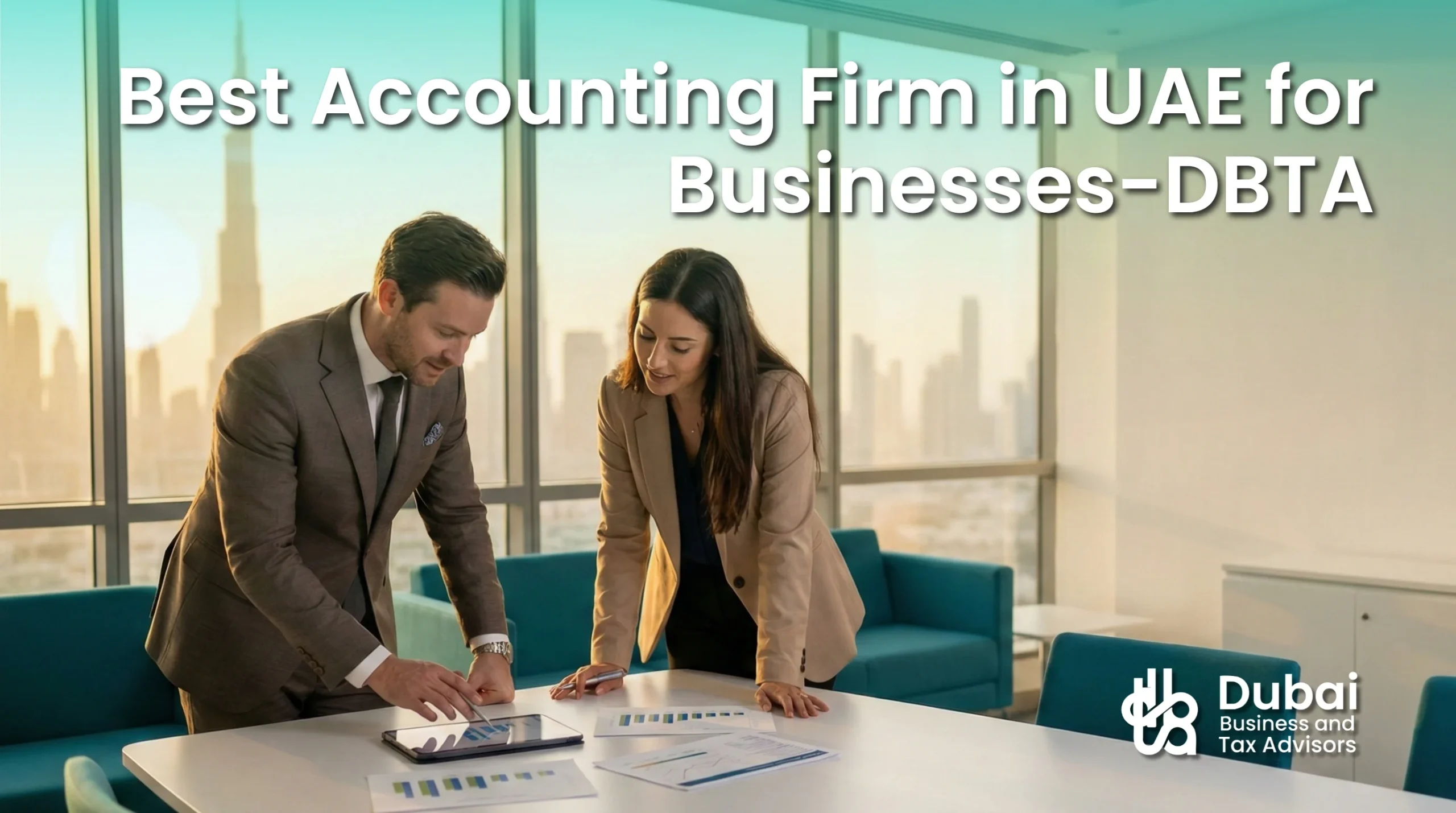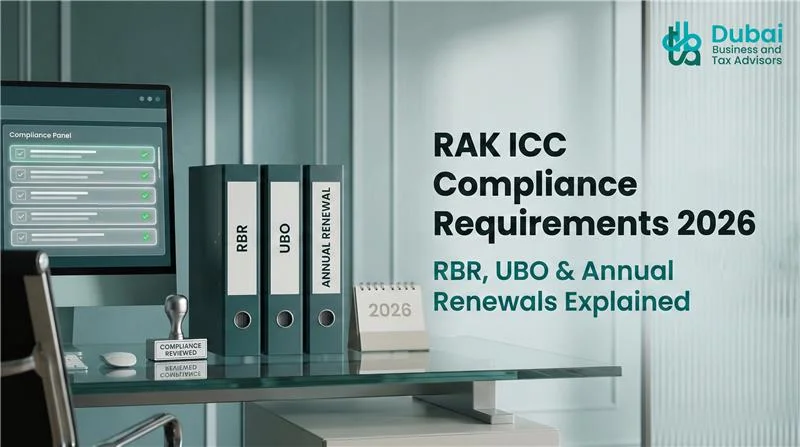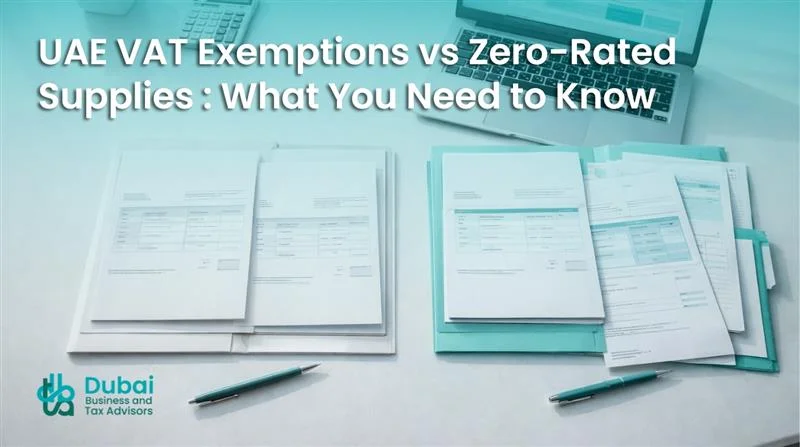Free Zone vs. Mainland Company in the UAE: Key Differences Explained
Recent Insights
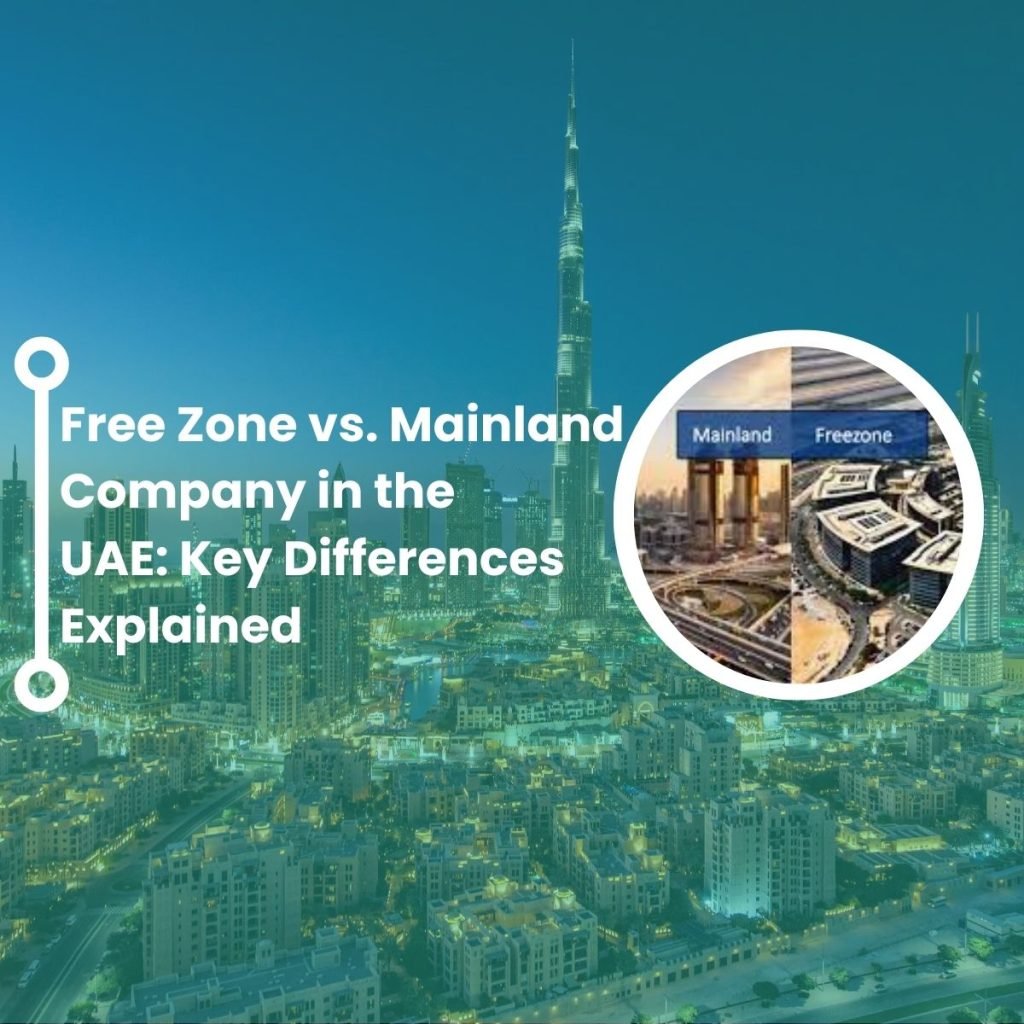
Establishing a company in the United Arab Emirates is widely regarded as a strategic choice for global entrepreneurs and investors due to its business-friendly environment. But a very early and very important decision you’ll have to make is whether to set up a mainland company or a free zone company. This decision has implications for the type of company ownership, number of business operations, expenses, and regulatory obligations your company faces. Getting it right could result in smoother operations and long-term success, while the wrong decision could slow you down or could hinder progress or lead to unnecessary financial losses.
Being the business hub of UAE, Dubai provides customizable business formation solutions to meet a wide range of operational needs. In two categories; UAE mainland company formation and UAE free zone company setup. Each setup has unique advantages and limitations, making them better suited for specific business types and goals.
In this guide, we’ll walk you through the main differences between free zone and mainland businesses, tax matters, licensing, costs, and market opportunities. We’ll also explain how Dubai Business and Tax Advisors can assist you to make this critical decision and make sure your business succeeds in the UAE.
What Is a Mainland Company in the UAE?
A mainland company formation UAE refers to businesses registered with the Department of Economic Development (DED) in any of the seven emirates. Mainland companies are permitted to operate throughout the UAE without geographic restrictions, enabling direct engagement with customers across the UAE, including partnerships with government bodies.
Why Choose Mainland?
As of 2023, mainland companies accounted for over 70% of new business registrations in Dubai, highlighting their growing dominance in the local economy.
Unrestricted Market Access:
Mainland companies can trade with any customer across the UAE, including government and public sector bodies. This access is vital for businesses aiming for local sales or government contracts.
100% Foreign Ownership in Most Sectors:
In a major policy shift starting in 2021, the UAE allows full foreign ownership of mainland companies in most commercial and industrial sectors, eliminating the old 51% local sponsor requirement. This move has encouraged foreign investment significantly.
Wide Range of Business Activities:
Mainland licenses cover almost every industry—from retail and manufacturing to consultancy and construction. This flexibility supports diverse entrepreneurial ventures.
Mandatory Physical Office:
Mainland businesses are required by the DED to have physical office space, with minimum space requirements determined by the business’s operational scope and licensing needs.
Higher Visa Quotas:
Mainland companies generally qualify for larger visa allocations, helping businesses hire and retain more employees.
Government Contract Eligibility:
Only mainland companies are eligible to bid for and win government contracts and tenders, which can be lucrative for many industries.

What Is a Free Zone Company in the UAE?
A free zone company is a business entity registered within one of the UAE’s many free zones. Dubai alone has more than 30 free zones, collectively hosting over 30,000 companies as of late 2023. These zones are special economic areas designed to attract foreign investors by offering tax incentives, full foreign ownership, and relaxed regulatory requirements.
Advantages of Free Zones
100% Foreign Ownership: Free zone companies have consistently offered full foreign ownership, unlike mainland entities before the 2021 reforms, and never required a local sponsor.
Tax Benefits: A number of free zones provide tax holidays ranging from 15 to 50 years, depending on the free zone and business activity, which include exemptions for corporate and personal income taxes.
Streamlined Setup Process: Business registration, licensing, and visa issuance in free zones are generally quicker and less bureaucratic than in mainland jurisdictions.
Flexible Office Options: Free zones offer various office solutions that suit companies of all types, including serviced offices, warehouses, virtual offices and coworking spaces which range from the smallest startup to a big enterprise.
Industry-Specific Focus: A large number of free zones are specific to a particular industry (media, finance, technology or logistics), offering industry-specific infrastructure and a professional network.
Restricted Market Access: Free zone companies must operate primarily within their zone or engage in international trade. They are not allowed to trade directly in the UAE mainland unless they appoint a local distributor or agent.
Table 1: Mainland vs Free Zone Dubai – Key Differences at a Glance
| Aspect | Mainland Company | Free Zone Company |
|---|---|---|
| Ownership | 100% foreign ownership in most sectors | 100% foreign ownership |
| Market Access | Unlimited within UAE | Restricted to free zone & international markets |
| Office Space Requirement | Physical office mandatory | Flexible: virtual, shared, or physical |
| Trading in Mainland Market | Allowed without restrictions | Not allowed directly; needs local distributor |
| Visa Quotas | Generally higher | Varies widely by free zone |
| Licensing Authority | Department of Economic Development (DED) | Free zone authority |
| Corporate Tax | 9% on profits above AED 375,000 (since 2023) | Tax holidays and exemptions (conditional) |
| Setup Costs | Higher due to office and compliance fees | Lower initial and ongoing costs |
Ownership: A Major Shift in Mainland Business Setup
Until recently, foreign investors were legally required to assign 51% ownership of mainland companies to a UAE national. This was often a significant hurdle, limiting control and profit-sharing.
However, since 2021, the UAE government has introduced reforms allowing 100% foreign ownership in most mainland activities. This has made mainland companies much more attractive to foreign investors who seek full access to the UAE market while retaining complete ownership of their business.
Exceptions: Some sensitive sectors such as oil and gas, banking, and certain professional services still require a local partner or service agent.
Market Access and Business Scope: Mainland vs Free Zone
Your choice between mainland and free zone setup should align with where and how you intend to conduct business within or outside the UAE.
Mainland Advantages:
1- Trade across all UAE emirates.
2- Dealing directly with government and public sector clients.
3- Eligible to bid for major government and public sector contracts.
Free Zone Limitations:
1- Limited to operations within the free zone unless specific permissions or partnerships are established.
2- Export goods and services internationally.
3- Cannot sell directly in the UAE mainland without a local distributor or agent.
A mainland company is generally more appropriate for enterprises focused on serving residents and customers across the UAE.
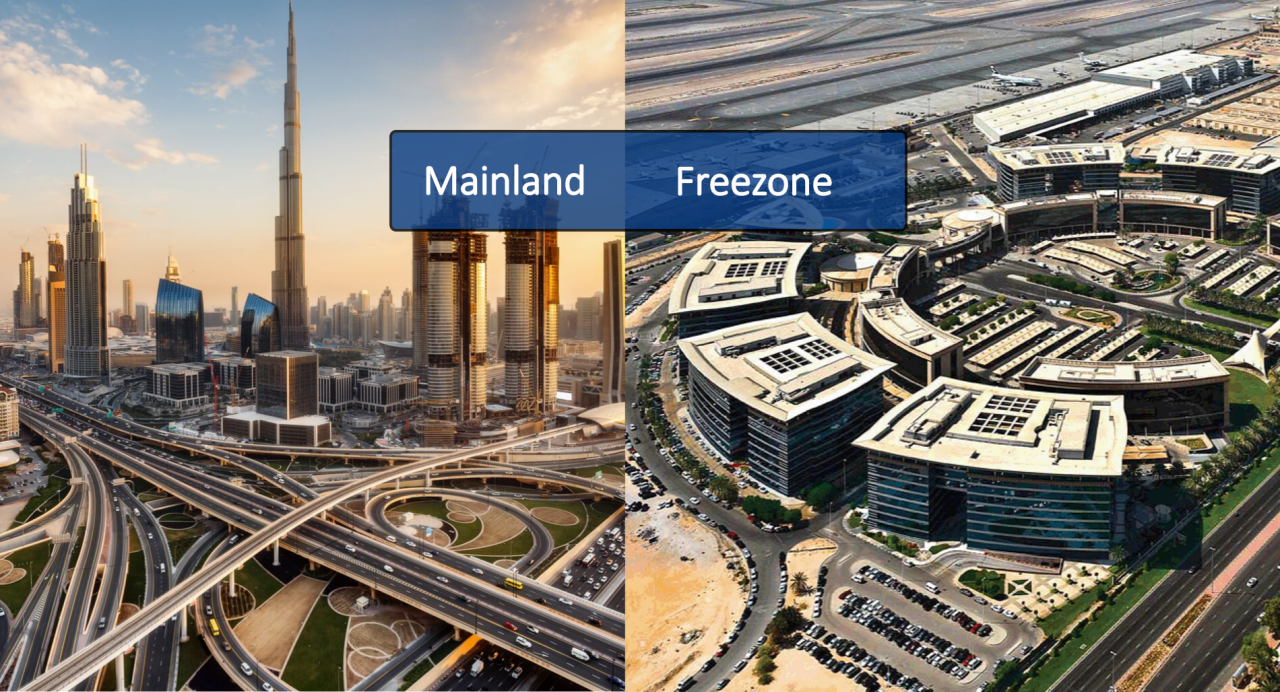
Licensing and Regulatory Authorities
Mainland companies are registered and regulated by the Department of Economic Development (DED) in each emirate. The mainland companies operate under UAE commercial laws and legislation.
Each free zone operates under its own regulatory framework, with independent licensing procedures and authorities, often offering faster approval timelines than the mainland.
Office Space and Visa Allocations
1- Mainland companies must lease physical office space that meets DED requirements, usually larger and more costly.
2- Free zones offer flexible office solutions ranging from virtual offices to serviced spaces, suitable for startups and SMEs.
3- Mainland companies usually have higher visa quotas, allowing more employees to work.
4- Free zone visa quotas vary widely depending on the zone and type of license.
Table 2: Business Setup Costs in UAE — Mainland vs Free Zone
| Cost Component | Mainland Company (AED) | Free Zone Company (AED) |
|---|---|---|
| Business Registration | 10,000 – 20,000 | 7,000 – 15,000 |
| Annual Office Rent | 20,000 – 50,000+ | 10,000 – 30,000 |
| Local Sponsor Fees | Applicable in some cases | Not applicable |
| Visa Fees (per visa) | 5,000 – 7,000 | 4,000 – 6,000 |
| Trade License | 10,000 – 25,000 | 7,000 – 20,000 |
| PRO/Legal Fees | 5,000 – 10,000 | 3,000 – 7,000 |
Prices vary significantly by emirate, activity, and office size.
Free Zone Benefits and Restrictions
Benefits:
1- Full foreign ownership with no local partners.
2- Tax exemptions and repatriation of capital.
3- Lower setup and operational costs.
4- Sector-focused zones with supportive infrastructure.
Restrictions:
1- No direct mainland trading.
2- Some free zones limit business activities.
3- Lower visa quotas.
4- Additional costs and arrangements are required to trade on the mainland.
Tax Implications: UAE Mainland vs Free Zone
The UAE’s tax landscape is attractive but nuanced:
1- Mainland companies pay 9% corporate tax on profits exceeding AED 375,000 (since June 2023).
2- Free zones offer tax holidays but require strict compliance to maintain exemptions.
3- VAT of 5% applies equally to all companies in the UAE.
4- Double taxation treaties and residency rules can affect your tax position — expert advice is vital.
How Dubai Business and Tax Advisors Can Help You Succeed
Determining whether to establish a mainland or free zone company in Dubai involves strategic planning, not just legal compliance. Partnering with Dubai Business and Tax Advisors means a smooth launch, full legal compliance, and strategic positioning for success. Here’s how Dubai Business and Tax Advisors can help:
1- Personalized Business Advice: We analyze your industry, business model, and goals to recommend the ideal company structure.
2- Mainland Company Formation UAE: Our team handles all paperwork, licensing, office setup, and compliance to get you operational quickly.
3- Free Zone Company Setup: We assist with free zone selection, license applications, office leasing, and visa processing to align with your financial requirements, operational needs, and future business goals.
4- Regulatory Compliance & Tax Planning: We simplify complex UAE regulations and optimize your tax position considering corporate tax, VAT, and exemptions.
5- Visa & PRO Services: Our professional PRO team handles staff visa processing, renewals, government liaisons and all other paperwork services allowing you to focus on core business activities while managing the administrative workload.
6- Cost Optimization: We strive to minimize upfront and ongoing costs so that your investment is smart and sustainable.

FAQs
A free zone is an economic zone in the United Arab Emirates that is designed to encourage foreign investment by offering competitive business advantages. Businesses operating as free zone companies, for instance, can have 100% foreign ownership, pay no corporate taxes for a set period of time, and benefit from streamlined business set-up requirements. These zones often focus on particular businesses, whether in media, logistics or technology, and offer specialized infrastructure. But in general, free zone companies are limited to operating within their zone or engaging in international trade and cannot do business in the UAE mainland without a local distributor or agent.
Yes. After landmark reforms in 2021, most mainland companies in the UAE can now be 100 percent owned by foreign investors, without requiring a local sponsor. This change is applicable in several areas of commerce and industry, with the added benefit that foreign entrepreneurs can maintain full operational control and keep all profits. But some sensitive sectors such as oil and gas, aviation and some professional services still need a UAE national business partner or service agent. If you are not certain, an experienced consultant such as Dubai Business and Tax Advisors can provide detailed guidance tailored to your business sector and goals.
Mainland companies are licensed by the Department of Economic Development (DED) in the emirate where they are registered. This license allows unrestricted trade anywhere within the UAE, including government contracts. Free zone companies, on the other hand, are licensed by the free zone authority specific to their zone. Their licenses permit operations only within the free zone and international markets. Free zone companies cannot trade directly with the mainland market unless they engage with a local distributor or establish a mainland branch, highlighting how jurisdictional control and operational reach differ significantly between the two business types.
Mainland companies are required by law to have a physical office space that complies with DED regulations, often with a minimum size depending on the business activity. This requirement can lead to higher costs, but it ensures a tangible presence in the UAE market. Conversely, most free zones offer flexible workspace solutions suited to varied business needs, many free zones allow virtual offices or shared workspace arrangements, which makes them ideal for startups seeking lower overhead, operational agility, and businesses with lower physical space needs or budgets.
No, free zone companies have limited operational scope and are limited to operating within their respective free zone or internationally and are not allowed for free trade within the UAE mainland. To serve the mainland market, a free zone company must engage a local distributor or agent or establish a mainland branch or subsidiary, which involves additional costs and legal procedures. This limitation is an important consideration when deciding between mainland and free zone setups based on your target market.
The right option depends on your startup’s business objectives and market strategy. If you are considering international markets or sectors that are supported by free zones (like tech or media), then a free zone company will provide you with faster set up, lower costs and 100% foreign ownership, suited for new businesses aiming to minimize costs and accelerate market entry. But if you want to cater to the UAE local market, win government tenders, or employ more employees, a mainland company is better because of the broad market access and larger visa quotas it provides. Consulting with experts such as Dubai Business and Tax Advisors can help tailor the best option for your startup needs.
Conclusion
Deciding between setting up a mainland or free zone company in the UAE is a critical choice that shapes your business’s future trajectory. Mainland companies offer expansive access to the UAE market and now permit 100% foreign ownership in most sectors. Free zones offer tax advantages, full foreign ownership, and streamlined setup processes, though they restrict direct mainland operations.
Evaluate your business goals, ownership preferences, market needs, and budget carefully. And remember, expert guidance from Dubai Business and Tax Advisors can make the difference between a smooth, compliant launch and costly setbacks.
About the Author:
AURANGZAIB CHAWLA
As CEO of DBTA, Aurangzaib Chawla advises globally mobile businesses and individuals on cross-border tax planning and structuring. With expertise spanning the UK, UAE, and wider GCC, Zaib helps clients minimise double taxation, protect assets, and achieve long-term financial efficiency while staying fully compliant.
Planning to launch in Dubai or the UAE?
Let’s talk about how to structure your business for growth the smart, compliant, and tax-efficient way
About the Author:
AURANGZAIB CHAWLA

As CEO of DBTA, Aurangzaib Chawla advises globally mobile businesses
and individuals on cross-border tax planning and structuring. With expertise spanning the UK, UAE, and wider GCC, Zaib helps clients minimise double taxation, protect assets, and achieve long-term financial efficiency while staying fully compliant.
Planning to launch in Dubai or the UAE?
Let’s talk about how to structure your business for growth the smart, compliant, and tax-efficient way.


